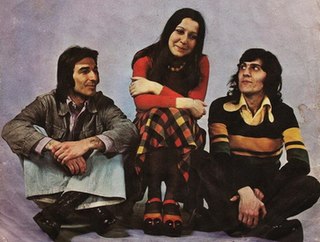Related Research Articles

Zlatan Stipišić, also known as Gibonni, is a Croatian singer-songwriter and composer. He is one of the most successful and awarded recording artists from Croatia, receiving record-high 43 Porin music awards for his albums and songs.

Alogia is a Serbian heavy metal band from Smederevo.

Alija "Alen" Islamović is a Bosnian rock vocalist. He is best known as the lead singer of Bosnian and Yugoslav rock bands Divlje jagode from 1981 to 1986 and Bijelo Dugme from 1986 to 1989.

Jugoton was the largest record label and chain record store in the former Yugoslavia based in Zagreb, SR Croatia.

Sead "Zele" Lipovača is a Bosnian and Yugoslav rock musician, songwriter and music producer, currently based in Zagreb, Croatia, best known as the guitarist and leader of the popular hard rock and heavy metal band Divlje Jagode.

Divlje Jagode is a hard rock and heavy metal band, originally formed in 1977 in Sarajevo, SR Bosnia and Herzegovina, SFR Yugoslavia, and since their 1994 reunion based in Croatia. Led by guitarist Sead "Zele" Lipovača, Divlje Jagode are considered one of the most popular and most influential acts of the Yugoslav hard rock and heavy metal scenes.

One Records is a record label based in Belgrade, Serbia.

Električni Orgazam is a Serbian rock band from Belgrade. Originally starting as a combination of new wave, punk rock and post-punk, the band later slowly changed their style, becoming a mainstream rock act. They were one of the most notable acts of the former Yugoslav rock scene.

Griva was a Serbian and Yugoslav hard rock band formed in Novi Sad in 1982.

Osvajači are a Serbian and Yugoslav hard rock band formed in Kragujevac in 1990.

Snežana Mišković, better known by her stage name Viktorija, is a Serbian and Yugoslav semi-retired rock singer. Known for her raspy voice, Viktorija was one of the most popular and prominent female vocalists of the Yugoslav rock scene.

Balkan was a Serbian and Yugoslav rock band formed in Novi Sad in 1982. Formed and led by guitarist and vocalist Aleksandar "Leki" Cvetković, Balkan were known for their social-related lyrics critical of the Yugoslav social reality.

Dža ili Bu are a Serbian punk/alternative rock band formed in Belgrade in 1987. The band was one of the most prominent acts of the 1990s and 2000s Serbian rock scene. Dža ili Bu initially performed punk rock, but during the years incorporated elements of other genres into their sound, maintaining politically and socially provocative lyrical style throughout their whole career.

Što te tata pušta samu is the fourth studio album by Serbian and Yugoslav hard rock band Griva, released in 1988.

Motori is the third studio album by the Yugoslav and Bosnian heavy metal band Divlje Jagode. The album was recorded at Music Paark Studio in Bad Homburg vor der Höhe, West Germany and was released in September 1982. It is considered the band's breakthrough album and it sold around 500,000 copies. The song "Ne želiš kraj" was written by former vocalist Ante "Toni" Janković, who previously left the group due to musical differences and was replaced by Alen Islamović. Janković joined the band on stage during the tour in support of the album.
YU retROCKspektiva is a compilation album series released by Serbian record label Komuna in 1994. The discs, compiled by Serbian music critics Bogoljub Mijatović and Peca Popović, feature songs by artists from the former Yugoslav rock scene.

Metak was a Yugoslav rock band formed in Split in 1978.

Žanil Tataj – Žak, is a Croatian musician, singer, composer and producer.

Lutajuća Srca was a Serbian and Yugoslav rock band formed in Niš in 1970. They were one of the most notable representatives of the 1970s Yugoslav acoustic rock scene.
Željko Brodarić "Jappa" is a Croatian and Yugoslav musician and music producer, known as the guitarist and vocalist of the rock band Metak, as well as for producing albums by a number of prominent acts of the Yugoslav rock scene.
References
- 1 2 3 4 5 6 7 8 9 10 11 12 13 14 15 16 17 18 19 20 21 22 23 24 25 26 27 28 29 30 31 32 33 34 Janjatović, Petar (2024). Ex YU rock enciklopedija 1960–2023. Belgrade: self-released / Makart. p. 218.
- ↑ "Splitski heavy bend Osmi putnik doživio je svoju preobrazbu. Večeras nastupaju na spektaklu "Legende rocka na legendarnim terenima" u Vukovarskoj", Dalmacija Danas
- ↑ 60 хитова емисије ПГП на 202!, facebook.com